Germany’s Budget Cuts Leave Heavy Industry Stuck with Dirty Tech
Germany’s budget cuts have frozen key industrial climate projects, leaving steel, cement, and chemical sectors stuck with high-emission technologies.

Germany's heavy industry — long seen as the backbone of Europe’s largest economy — is facing an environmental and economic dilemma as sweeping budget cuts have curtailed key green transition initiatives. Major industrial players, from steel to chemicals and cement, are now stuck with outdated, high-emission technologies due to a lack of federal funding to support decarbonization.
The budget squeeze, prompted by a constitutional court ruling that restricted the government's ability to reallocate pandemic-era emergency funds, has frozen or delayed several flagship climate projects. The resulting policy vacuum threatens to derail Germany’s 2045 carbon neutrality target and weakens its industrial competitiveness in an increasingly green global market.
A Harsh Reality for Heavy Industry
Germany's energy-intensive sectors have been at the heart of its economic model, but they are also some of the country's biggest polluters. The steel industry alone accounts for about 6% of the nation’s total CO₂ emissions. Efforts to shift to cleaner alternatives — such as hydrogen-based steel production — had gained momentum under the government’s climate action programs. But now, progress has stalled.
“The climate-friendly transformation of German industry is hitting a brick wall,” said Dr. Andreas Fischer, senior energy analyst at RWI – Leibniz Institute for Economic Research. “The federal budget constraints have left no fiscal room to fund industrial decarbonization on the scale originally planned.”
In December 2023, Germany’s top court ruled that around €60 billion in unused COVID-19 funds could not be repurposed for climate and transformation projects. The ruling triggered a domino effect of spending cuts, including to the Climate and Transformation Fund (KTF), which had been earmarked for industrial subsidies and green tech R&D.
Projects in Limbo
Among the most impacted initiatives are:
-
Hydrogen-ready steel plants, such as those planned by Thyssenkrupp and Salzgitter, which now face funding gaps.
-
Carbon capture and storage (CCS) pilots in the cement sector.
-
Energy-efficient retrofits for heavy industrial facilities.
-
Electrification projects in the chemicals industry that rely on subsidies for high electricity usage.
Germany had planned to invest €211 billion from the KTF between 2024 and 2027. But after the court ruling, the fund’s revised spending plan saw cuts of over €20 billion. The industrial sector is feeling the pinch.
“We’ve already paused two major hydrogen infrastructure projects,” revealed a senior executive from a leading German steel manufacturer on condition of anonymity. “Without state support, they’re not economically viable.”
Market Context: A Carbon Competitiveness Crisis
Germany’s heavy industries are now at a crossroads. While competitors in the U.S. and China benefit from massive state-backed green investments — like the U.S. Inflation Reduction Act and China’s dual carbon goals — German firms are left with less capital to modernize.
This imbalance could result in a carbon leakage effect, where industrial production shifts to countries with looser climate standards or better funding environments.
“Global decarbonization is not just about technology — it’s also about money and policy coherence,” said Isabelle Werenfels, policy analyst at the German Institute for International and Security Affairs. “Germany risks losing its green technology leadership if it continues to underfund the transition.”
Political Repercussions and Public Debate
The cuts have ignited political tensions within the ruling coalition of Social Democrats (SPD), Greens, and Free Democrats (FDP). While Finance Minister Christian Lindner of the FDP insists on fiscal discipline, Green Party leaders argue that abandoning industrial climate funding jeopardizes Germany’s long-term economic future.
“We must not let budget constraints destroy years of progress toward decarbonization,” said Economy and Climate Minister Robert Habeck in a recent Bundestag address. “These investments are essential for jobs, innovation, and our climate targets.”
Public support for climate policy remains strong, but concerns about affordability and energy security persist amid geopolitical tensions and inflationary pressures.
Investor Outlook: Green Transition at Risk
For investors, Germany’s current trajectory raises red flags. Analysts warn that without state-backed incentives, ESG-aligned investments in German industry may slow, particularly in hard-to-abate sectors.
“Investors are reassessing the risk-reward ratio in Germany’s industrial decarbonization space,” noted Carla Neuhaus, sustainability strategist at Allianz Global Investors. “The policy uncertainty is dampening momentum and could divert capital to more supportive jurisdictions.”
Yet, some companies are pressing ahead using private capital, EU funds, or international partnerships — though at a slower pace.
The Road Ahead
Germany still has options. The federal government is exploring new financing models, including green bonds, public-private partnerships, and EU-level funding mechanisms. But these are unlikely to fully replace the scale of the now-halted KTF programs.
The challenge for Berlin is to maintain fiscal credibility while delivering on its climate commitments. Failure to do so risks undermining Germany’s economic leadership and climate diplomacy just as the world eyes tougher global climate goals post-COP29.
For now, heavy industry remains locked in a status quo of high emissions and outdated tech — a situation increasingly at odds with Germany’s green ambitions.
What's Your Reaction?
 Like
0
Like
0
 Dislike
0
Dislike
0
 Love
0
Love
0
 Funny
0
Funny
0
 Angry
0
Angry
0
 Sad
0
Sad
0
 Wow
0
Wow
0













































































